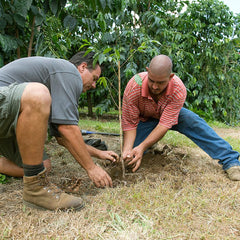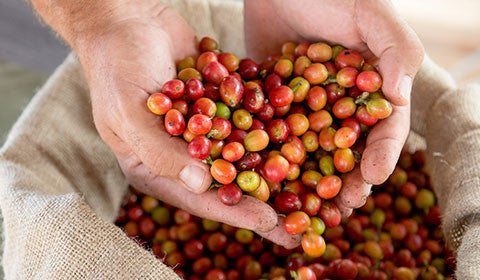Posted on

We’ve all heard the saying that drinking too much coffee with stain your teeth, but is this really true? Can coffee cause other adverse effects to our teeth?
Coffee, as well as other dark flavored beverages, have been known to cause your teeth to become discolored after extended periods of use. Thankfully that discoloration is just a cosmetic issue and isn’t causing any damage to your teeth, but could the coffee be doing damage that you can’t see?
White strips and dental whitening can bring your teeth back from their yellowish color, but there could be some underlying issues caused by coffee as well. Depending on the type of coffee you drink, what outside ingredients you add to your coffee, and how much coffee you drink, you could be causing unseen damage to your teeth that could cause problems down the line.
Coffee Breaks Down Tooth Enamel
While yellowing teeth can become annoying, at least they are only cosmetic and can be reversed with whitening strips or a trip to the dentist. Tooth enamel on the other hand does not grow back and can be impacted by the acids and sugars in coffee-based drinks.
Enamel is the outer layer of your teeth that offers up a layer of protection from outside elements. Over time certain chemicals and compounds can start to wear away the enamel which can lead to cavities and tooth decay.
Coffee itself, without any added ingredients, can slowly break down the enamel in your teeth because of the acidic factor of the liquid, however it does not cause cavities or tooth decay on its own.
If you’re drinking black coffee, or coffee with little cream or sugars, you can rest assured knowing that the coffee itself is not contributing to your tooth decay, but may be opening up your teeth to further damage from other foods and beverages.
If you’re looking for ways to help prevent the breakdown of the enamel on your teeth from coffee consumption, drinking water after a cup of coffee is a great way to help rinse your mouth of the acidic properties of coffee. You can also eat acid-neutralizing foods like cheese.
High Sugar Coffee and Your Teeth
The good news is that coffee on its own is not going to damage your teeth or cause cavities, however with its ability to eat away at the enamel on your teeth, this could pave the way for cavities to form based on other foods you eat and drink.
If you’re like a lot of coffee drinkers, you don’t drink your coffee straight. Most people add some sort of flavoring, cream, or sugar to their coffee to give it different flavors. It’s those flavorings and sugar additives that could cause cavities and tooth decay if you’re not careful.
Adding sugar to your coffee or drinking a coffee drink that is high in sugar content, can cause tooth decay and cavities in the same way that eating sugary foods or drinking sugary sodas can. The acid in the coffee wears down the enamel and the sugars can then get into the inner tooth and start to eat away at it.
So, if you’re worried about your teeth when it comes to your coffee consumption, try to avoid the coffee beverages with high sugar content. And after you’re done with your cup, drink some water to help rinse your teeth of the sugars and acids from the coffee.
Coffee and Wisdom Teeth
Another question that a lot of people have when it comes to teeth and coffee is whether or not it’s ok to drink coffee after you’ve had your wisdom teeth removed, or any tooth extraction for that matter.
The simple answer is, no, you want to avoid hot coffee and other hot beverages, while the area is healing from the extraction.
When you have a tooth extracted a blood clot is going to form in the area where the tooth was. This is part of the healing process. By drinking hot beverages like coffee, you can disrupt the formation of the blood clot and dislodge existing clots which can lead to dry socket. Dry socket can be extremely painful and leave a bad taste in your mouth, so it’s best to just abstain from drinking large amounts hot beverages for about 5-7 days after your tooth extraction.
At about 2-weeks after the extraction you should be healed enough to return to your normal coffee drinking routine without having to worry about dry socket.
Coffee and Your Teeth
Coffee can affect your teeth in many different ways depending on how you drink it. Black coffee, or coffee with no additives, will not cause tooth decay on its own, but it can wear down the enamel on your teeth which will allow for sugars and bacteria to attack your tooth.
Drinking sugary coffee drinks will introduce more sugars to your mouth and can lead to bacteria growth and tooth decay over time. And if you’ve had a tooth extracted recently, hot coffee can disrupt the healing process.
We only get one set of adult teeth in our lifetime, so if you’d rather not have to resort to dentures or implants, it’s important to make sure you take care of your teeth with proper brushing and flossing.
And remember, as long as you’re taking care of your teeth, you can still enjoy your morning cup of coffee.






